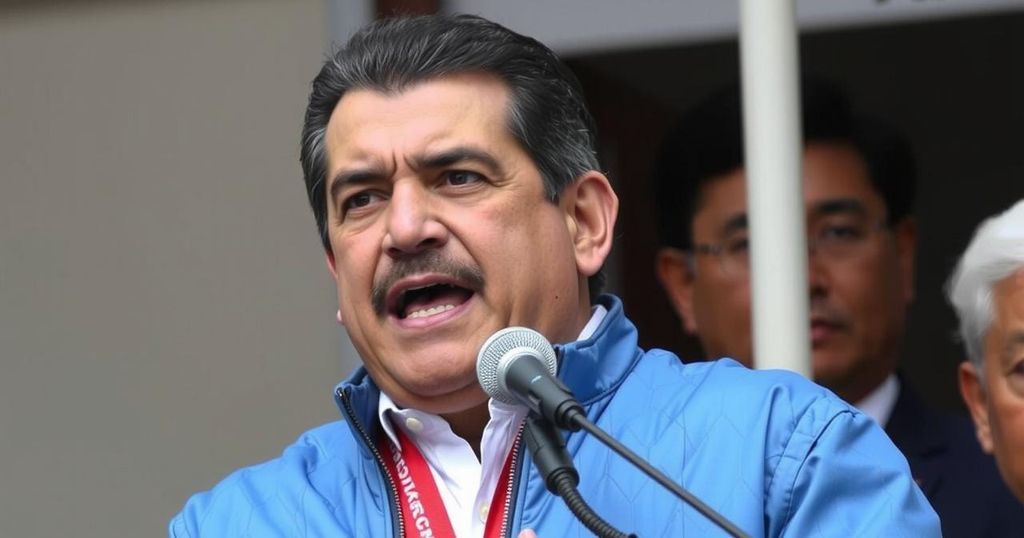Nicolás Maduro was sworn in for a third term as Venezuelan president despite credible evidence of electoral fraud favoring opposition leader Edmundo González. His inauguration was marked by heavy security and international condemnation, with new sanctions imposed on Venezuelan officials. Protests erupted in the capital as opposition supporters led demonstrations against Maduro’s rule, which has been characterized by repression and allegations of election manipulation.
CARACAS, Venezuela — Venezuelan President Nicolás Maduro officially commenced his third consecutive term on Friday, extending his tenure until 2031 amidst evident protests and substantial evidence of a disputed electoral victory. His inauguration took place in a heavily secured legislative palace, where he delivered a fervent address to assembled supporters while dismissing allegations from the opposition regarding electoral fraud.
During his speech, Maduro accused opposition factions of attempting to undermine the ceremony and portrayed the opposition’s failure to disrupt the event as a major victory for Venezuela. He vehemently criticized external influences, specifically naming the United States, claiming they acted in aggression against Venezuela while asserting his constitutional authority as president. Maduro stated, “Today more than ever I feel the weight of commitment, the power that I represent, the power that the constitution grants me.”
Controversy surrounds the recent elections held on July 28, with opposition groups asserting that more than 80% of the voting data demonstrates their candidate, Edmundo González, received double the votes compared to Maduro. Observers, including the U.S.-based Carter Center, have validated these claims, intensifying international scrutiny over Maduro’s administration. In the wake of the electoral controversy, both the European Union and the U.S. Treasury Department imposed new sanctions on Venezuelan officials linked to the electoral process, citing their role in jeopardizing democracy.
Amidst the turmoil, opposition leader María Corina Machado was reportedly detained briefly while attempting to advocate for González’s recognition as president. The U.S. president-elect, Donald Trump, voiced his support for Machado and her cause, condemning the persecution of those opposing Maduro’s regime.
As the unrest unfolded, the Venezuelan authorities demonstrated a heavy-handed approach, arresting over 2,000 protesters, while more than twenty reported fatalities occurred in the uprising. Despite the backlash, Maduro’s supporters expressed unwavering loyalty, claiming devastating media narratives obscured the realities of support for the incumbent leader.
The international community continues to condemn the Venezuelan government, demanding accountability and transparency regarding electoral proceedings. As the situation develops, the fate of González remains uncertain as he faces threats of arrest upon returning to Venezuela after fleeing to Spain.
Nicolás Maduro’s presidency has been characterized by controversy and allegations of electoral fraud, particularly following elections that have raised questions over their legitimacy. His previous term saw widespread international condemnation and protests against his increasingly authoritarian rule. The recent elections leading to his current term highlight the persistent division within Venezuelan politics, where opposition parties claim significant electoral manipulation. This current political strife, entangled with external political dynamics, emphasizes the struggle for democracy in Venezuela and the humanitarian crisis affecting its citizens.
In summary, Nicolás Maduro’s inauguration for a third term unfolds amidst heightened tensions and claims of electoral fraud, with strong opposition from both international entities and local activists. The legitimacy of the electoral process continues to be challenged, as sanctions and protests escalate against the backdrop of increasing repression. The political climate in Venezuela remains volatile, with significant implications for its future governance and civil liberties.
Original Source: gvwire.com






